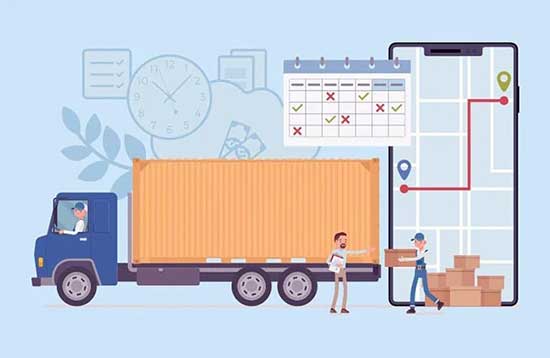

The efficiency of last-mile delivery, the final step in the delivery process from a distribution center to the customer's doorstep, has become a pivotal determinant of consumer satisfaction and business success. This phase of delivery is not only critical for ensuring customer satisfaction but also represents a substantial portion of total logistics costs. Over recent years, optimizing last-mile delivery has emerged as a fundamental focus for e-commerce businesses aiming to enhance operational efficiencies and significantly improve customer service. Effective management of this crucial stage can determine the speed and reliability with which products reach consumers, directly impacting brand loyalty and repeat business.
Challenges of Last-Mile Delivery
Several key challenges complicate the last-mile delivery process:
- High Costs: Last-mile delivery is often the most expensive part of the shipping process due to factors like vehicle maintenance, fuel, and driver wages.
- Urban Congestion: Delivering in densely populated urban areas can be slow and inefficient due to traffic congestion and parking issues.
- Customer Expectations: Today’s consumers expect super fast, reliable, and inexpensive delivery options, putting additional pressure on delivery systems.
- Geographical Barriers: In rural areas, the distances between stops are longer, which complicates delivery logistics and increases costs.
- Environmental Impact: There is a growing concern over the carbon footprint of last-mile delivery operations, pushing companies to seek more sustainable solutions.
The Role of a Transportation Management System in Streamlining Last-Mile Delivery

A Transportation Management System (TMS) is an integral component of supply chain management focused on transportation operations and is part of a broader logistics system or enterprise resource planning (ERP) system. TMS software provides an integrated platform that helps businesses plan, execute, and optimize the physical movement of goods, both incoming and outgoing, ensuring that the shipments are compliant and proper documentation is available. Last-mile delivery is increasingly vital in e-commerce logistics, where companies strive to deliver goods swiftly and efficiently.
Benefits of Transportation Management System in Last-Mile Delivery
To further illustrate the transformative impact of TMS on last-mile delivery, let's explore the specific benefits it offers in enhancing operational efficiency and customer satisfaction.
- Route Optimization: TMS software can analyze numerous routing options and choose the most efficient one, reducing delivery times and costs.
- Real-time Visibility: Enhanced tracking capabilities ensure that both the company and its customers can monitor parcels in real time, increasing transparency.
- Improved Customer Service: TMS features like automated notifications and mobile connectivity can improve communication with customers regarding their delivery status.
- Cost Reduction: By optimizing delivery routes and loads, TMS can significantly cut transportation costs.
- Sustainability: TMS software can help reduce the carbon footprint by optimizing delivery routes to minimize distances traveled and fuel consumed.
Also read: CIO PLAYBOOK SERIES: The Ultimate TMS Scouting Guide
Advanced Strategies for Optimizing Last-Mile Delivery with Transportation Management Systems
Implementing strategic measures using a robust transport management system can markedly enhance the efficiency and reliability of last-mile delivery:
- Advanced Route Planning: Utilizing sophisticated algorithms, TMS software can calculate the quickest and most cost-effective routes available. This involves analyzing historical data and current traffic patterns to predict the fastest routes, thereby minimizing delays and reducing fuel consumption. Advanced route planning also considers variables such as vehicle capacity and delivery windows to ensure that deliveries are both prompt and efficient.
- Dynamic Re-routing: Dynamic re-routing is a critical feature in modern TMS software that adapts delivery routes in real-time in response to various unexpected conditions such as traffic congestion, road closures, or weather conditions. This flexibility helps maintain on-time delivery schedules even under unpredictable circumstances. Furthermore, dynamic re-routing can adjust schedules based on customer availability, ensuring that deliveries are made when recipients are available to receive them, thus reducing the chance of missed deliveries.
- Customer-Centric Services: In today’s market, customer satisfaction is paramount. TMS enhances the customer experience by offering flexible delivery slots and providing real-time order tracking. Customers can choose delivery times that suit their schedules, increasing the likelihood of first-time delivery success. Real-time tracking enables customers to see the progress of their deliveries, which not only improves customer satisfaction but also reduces the volume of customer service calls regarding order status.
- Analytics and Reporting: Leveraging TMS-generated data to analyze trends and monitor performance is crucial for continuous improvement. These analytics help identify inefficiencies and bottlenecks in the delivery process and provide insights into customer behavior patterns. Reporting tools within TMS software can generate regular performance reports to help stakeholders make informed decisions and strategize improvements in delivery operations.
- Integration with IoT: The integration of Internet of Things (IoT) technology with TMS brings significant enhancements to shipment visibility and tracking accuracy. Devices such as GPS trackers, RFID tags, and sensors can monitor the conditions and locations of the shipments in real time. This technology not only ensures the security of the cargo but also improves the accuracy of delivery times, which is crucial for perishable goods or time-sensitive deliveries.
- Automated Scheduling and Dispatch: Automation plays a key role in reducing human errors associated with manual scheduling and dispatching. TMS software can automatically assign deliveries based on the proximity and availability of drivers, which optimizes delivery routes and maximizes fleet efficiency. This automation extends to the reallocation of resources in real time, adapting quickly to operational demands without extensive manual intervention.
- Green Logistics: Sustainability is increasingly becoming a priority in logistics. TMS supports green logistics by optimizing delivery routes to minimize distances traveled and consequently reduce fuel consumption. The adoption of electric delivery vehicles and the strategic planning of loading can further decrease the carbon footprint of delivery operations. By implementing these eco-friendly initiatives, companies not only comply with environmental regulations but also appeal to environmentally conscious consumers.
- Efficient Management of Returns: Transportation Management Systems (TMS) can play a crucial role in addressing one of the key pain points for e-commerce companies: the management of returns. Returns are an inevitable aspect of e-commerce, and they often complicate the logistics process, increasing operational costs and affecting customer satisfaction. TMS can streamline the returns process by enabling more efficient routing and scheduling of return pickups, minimizing the time and resources spent on reverse logistics. Furthermore, TMS can provide visibility into the returns process, allowing companies to track returned items in real-time, which enhances inventory management and reduces the likelihood of errors. This increased efficiency not only lowers the cost associated with returns but also improves the overall customer experience by ensuring quicker processing and refunding, thereby bolstering customer loyalty and trust.
Also read: Integrated Logistics Platform: A growth framework for 3PLs
Enhancing Last-Mile Delivery with Logistics ERP
As last-mile delivery complexities increase, businesses are adopting Logistics ERP solutions to optimize transportation workflows, enhance visibility, and improve cost efficiency. A logistic system integrated with ERP technology provides real-time data synchronization, predictive analytics, and automated resource allocation—critical for meeting the demands of modern e-commerce fulfillment.
A Logistics ERP enhances end-to-end supply chain visibility by integrating data from warehouses, distribution centers, and transportation networks. This enables businesses to track shipments in real time, identify bottlenecks, and make data-driven decisions that improve on-time deliveries. Moreover, predictive analytics within logistics systems help anticipate demand fluctuations, ensuring that inventory and fleet resources are efficiently allocated to minimize delivery delays.
Optimized resource allocation is another key advantage of logistics ERP. By leveraging AI-driven automation, businesses can dynamically assign deliveries based on driver availability, vehicle capacity, and traffic conditions. This reduces empty miles, enhances fleet utilization, and lowers transportation costs. Additionally, ERP-integrated logistic systems support automated dispatching, ensuring that delivery routes are continuously optimized for maximum efficiency.
When integrated with a Transportation Management System (TMS), Logistics ERP further enhances last-mile delivery performance. The combined capabilities of ERP and TMS enable automated dispatching, smart route planning, and real-time tracking, allowing businesses to provide accurate estimated delivery times and proactive customer notifications. These features significantly improve customer satisfaction and reduce failed delivery attempts.
Sustainability and cost reduction are also major benefits of logistics ERP. Intelligent route planning helps minimize fuel consumption, while ERP-enabled fleet management supports the integration of electric vehicles (EVs) and real-time carbon footprint tracking. Predictive maintenance powered by AI further reduces operational costs by preventing unexpected vehicle breakdowns that could delay deliveries.
By leveraging Logistics ERP, businesses can create a smarter, more resilient last-mile delivery network that improves efficiency, reduces costs, and enhances customer satisfaction. In today’s competitive logistics landscape, integrating ERP-driven solutions is essential for businesses aiming to optimize last-mile operations and scale sustainably.
Maximizing Efficiency with Advanced TMS Software
The role of TMS software in optimizing last-mile delivery has become increasingly critical as e-commerce businesses strive to enhance operational efficiency and meet rising customer expectations. A well-integrated transportation management software streamlines logistics operations, ensuring that shipments reach customers promptly while reducing costs and improving overall service quality.
By leveraging a powerful transport management system, businesses can optimize delivery routes, automate dispatching, and enhance real-time shipment tracking. These features significantly improve fleet utilization, reducing unnecessary mileage and fuel consumption. Additionally, TMS software enables seamless coordination between drivers, warehouses, and customers, ensuring that deliveries are executed with maximum precision.
The integration of transportation management software with emerging technologies such as IoT and AI further enhances visibility and decision-making capabilities. Smart route optimization powered by AI-driven analytics ensures that businesses can dynamically adjust delivery schedules in response to traffic congestion, weather conditions, or last-minute changes. This not only minimizes delays but also enhances customer satisfaction by providing accurate estimated delivery times.
Moreover, a comprehensive transport management system plays a crucial role in sustainability initiatives. By optimizing vehicle loads and implementing green logistics strategies, businesses can significantly reduce their carbon footprint while maintaining cost-effective delivery operations. As e-commerce continues to expand, adopting an advanced TMS software solution is essential for companies looking to stay competitive and scale efficiently in the evolving digital marketplace.
Expanding the Reach of E-commerce Through Effective TMS Implementation
With the continuous expansion of e-commerce markets, the demand for more effective delivery solutions is ever-increasing. A robust transportation management system becomes not just a logistic tool but a strategic asset, deeply integrated into the business model of e-commerce companies. These systems play a critical role in managing the complexities associated with large scale operations that handle countless transactions daily. As e-commerce continues to evolve, the implementation of sophisticated TMS solutions will be vital for companies aiming to scale their operations efficiently and sustainably.
Conclusion
In today's competitive e-commerce landscape, the implementation of a robust Transportation Management System (TMS) is not just beneficial—it's essential. As last-mile delivery continues to be a critical determinant of customer satisfaction and brand loyalty, businesses must adopt advanced TMS software to optimize their delivery operations. By doing so, they can enhance efficiency, reduce costs, and significantly improve customer service.


